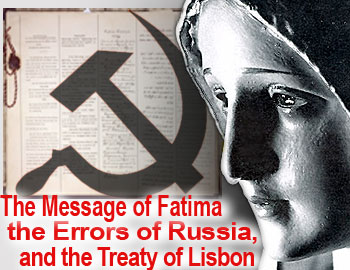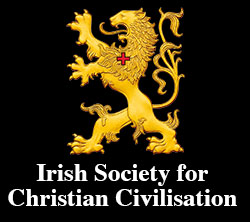
Perhaps it is a coincidence that, at the time of the apparitions of Our Lady in the small Portuguese village of Fatima, the capital of Portugal was considered to be the most atheistic city on earth. And certainly the Portuguese government of the time provided an immense challenge to the spreading of the Message of Fatima, and indeed to the Catholic ethos of Portugal itself. Although the reputation of Lisbon as atheistic capital of the world may have changed in the course of the 20th century, a new threat to Christian civilisation has emerged from that city. For it was there that the Treaty of Lisbon was agreed and signed on 13th December, 2007.
In the third apparition of Our Lady in Fatima, on 13th July, 1917, Our Lady warned that if man does not:
“…stop offending God, another even worse war will begin in the reign of Pius XI… To prevent it [the war], I will come to ask for the consecration of Russia to my Immaculate Heart and the Communion of reparation on the first Saturdays. If they listen to my requests, Russia will convert and there will be peace; if not, it will spread its errors throughout the world, promoting wars and persecutions of the Church. The good will be martyred; the Holy Father will have much to suffer, and several nations will be annihilated.”
What exactly are these errors of Russia, of which Our Lady speaks? What was so different about Russia, that Our Lady should single it out with such a comment?
The Russian Revolution took place in 1917. Its fruit in Russia was the formation of a new regime that became the foundation of the Soviet Union, which did, as Our Lady had predicted, promote wars and persecutions of the Church, where the good were martyred, which did annihilate several nations and which caused the Holy Father to suffer much.
This new regime was atheistic, and it persecuted religion, especially the Catholic Church. It enacted laws to diminish the role of the family and to abolish private property. It was the first government in modern times to openly promote abortion on demand, years before the eugenic program of Nazi Germany, and long before abortion was legalised in any western country. The breakdown of the family was almost complete in soviet society. The government usurped the place of parents in educating children. It interfered in every detail and every aspect of the life of its citizens. All power and authority were centralised.
So, what has all this to do with the Treaty of Lisbon?
In spite of much talk and debate over the years about subsidiarity, it is very little practiced in the European Union, and will be even less so if the Treaty of Lisbon is approved. There is already a marked tendency in the European Union, just as in the former Soviet Union, to centralise all authority. The Lisbon treaty will facilitate a further development of this tendency.
Already we have seen attempts by the EU to take control of education and schools from parents and religious denominations. Recently, for example, the European Commission has accused Ireland of being in breach of the EU’s equality directive because denominational schools, to enable them to protect their ethos, have exemption from some provisions of equality legislation.
On moral issues there has been much pressure from the EU to encourage legislation on abortion, homosexual unions and in various other areas in which the Catholic social and moral teaching would be adversely affected. For example, the Alliance of Liberals and Democrats for Europe are openly campaigning to have abortion and euthanasia recognised as “human rights” throughout Europe, and an associated group, “Make Noise for Free Choice” is hoping to use provisions of the Lisbon treaty to enforce this, wishing to specifically target Ireland, as well as Poland and Malta. Meanwhile there is currently a case before the European Court of Human Rights, attempting to overthrow our ban on abortion in Ireland.
Until now the national governments within the union have been able to resist pressure from the EU institutions, in order to preserve their own identity and ethos.
However, the Treaty of Lisbon comes packaged with a new instrument which will wrest control of much of our legislation from our own government, especially in social and moral issues. This new instrument is the European Charter of Fundamental Rights, which, if the Lisbon treaty is approved, will be binding in law throughout Europe. Its implementation will be overseen by the European Court of Justice, which will have the power to ensure that national governments will comply with the Charter.
Through this charter the protection of human life will be restricted, and abortion, euthanasia and embryo experimentation will be facilitated. “Sexual orientation” will be recognised as a basis for non-discrimination, opening the way for homosexual marriage and adoption of children by homosexuals.
The Treaty of Lisbon amends previous treaties (the Treaty on the European Union and the Treaty establishing the European Community). In doing so it creates a new European Union such as the European Constitution would have created if it hadn’t been rejected by referendum in France and the Netherlands in 2005. Already at that time His Holiness, Pope John Paul II, lamented that there wasn’t a single reference to God in the Constitution, nor in the Charter of Fundamental Rights. He also lamented that the then Constitution completely failed to recognise the Christian roots of Europe. These omissions continue in the Treaty of Lisbon.
The errors of Russia, as Our Lady predicted in 1917, would be spread throughout the world. Already much of our legislation, and indeed that of every western country, is greatly influenced by the laws and especially by the ideology of the old Soviet Union. And like in the Soviet Union, the breakdown of the family is well advanced throughout the western world. Through the Charter of Fundamental rights, this situation could get even worse.Within this perspective the European Charter of Fundamental Rights is a vehicle for perpetuating these same errors.
For this reason, the Treaty of Lisbon should be rejected by all Catholics who wish to fulfil the requests of Our Lady of Fatima?
Subscribe to our newsletter!





